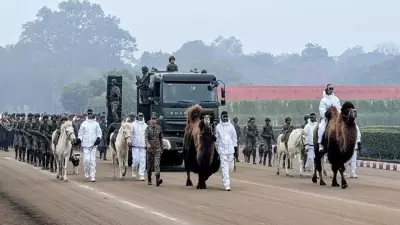
The Armed Forces Tribunal (AFT) has delivered a stern verdict against the Secretary of the Department of Ex-Servicemen Welfare (DESW), holding him accountable for contempt of court. This decisive action comes after the DESW failed to implement the tribunal's clear directives regarding pension benefits for armed forces personnel.
AFT's Strong Stand Against Government Inaction
The tribunal bench, comprising Justice Rajendra Menon and Lt Gen CP Mohanty, expressed deep frustration with the DESW's consistent disregard for judicial orders. The AFT specifically noted that the DESW Secretary cannot escape responsibility for non-compliance with pension implementation orders that directly affect the welfare of ex-servicemen and their families.
This contempt case originated from the DESW's failure to implement the AFT's previous orders dated February 16, 2023. Despite clear judicial instructions, the department had not taken necessary action to process and disburse pension benefits to eligible armed forces personnel, forcing the tribunal to take stringent measures.
The Legal Battle for Pension Rights
The Armed Forces Tribunal has been at the forefront of protecting the rights of military personnel, particularly concerning pension matters. The current contempt proceedings highlight the ongoing struggle between judicial directives and administrative implementation.
The tribunal emphasized that government departments cannot selectively choose which court orders to implement. Justice Menon specifically stated that the DESW Secretary, being the head of the department, bears ultimate responsibility for ensuring compliance with judicial directives. The bench observed that such disregard for tribunal orders undermines the entire judicial process and disrespects the rights of armed forces personnel.
Implications for Armed Forces Personnel
This landmark ruling has significant implications for thousands of armed forces personnel and veterans awaiting pension settlements. The AFT's strong stance sends a clear message that government departments must prioritize the welfare of those who have served the nation.
The tribunal has directed the DESW Secretary to appear personally before the bench to explain why contempt proceedings should not be initiated. This personal accountability measure is rare in such cases and underscores the seriousness with which the AFT views this matter.
Legal experts familiar with armed forces matters have welcomed the tribunal's firm position. They note that this decision could set a precedent for ensuring timely implementation of court orders concerning military personnel benefits. The ruling particularly emphasizes that bureaucratic delays and procedural excuses will no longer be tolerated when it comes to matters affecting ex-servicemen welfare.
The AFT has given the DESW a final opportunity to comply with all pending orders before taking further contempt action. The tribunal has made it clear that continued non-compliance could result in severe consequences, including potential penalties and stricter enforcement measures.
This development comes amid ongoing concerns about pension processing delays affecting armed forces veterans. The AFT's intervention is expected to accelerate the resolution of numerous pending pension cases and ensure that ex-servicemen receive their rightful benefits without further bureaucratic hurdles.





